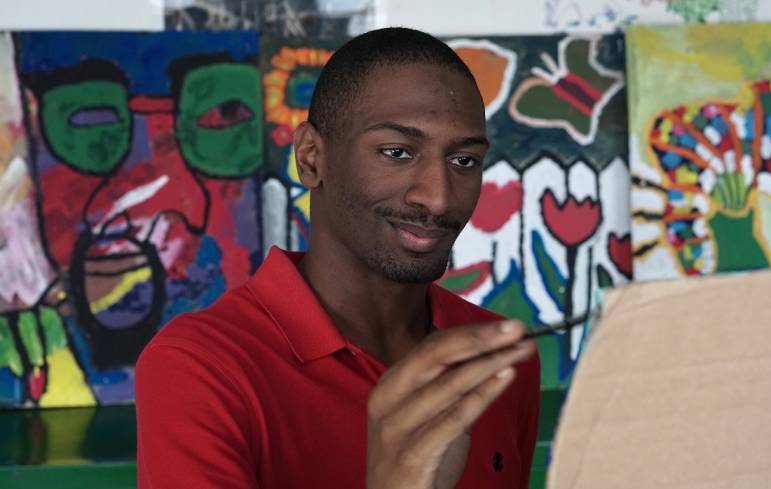
Publisher’s note: Manchester Ink Link and The New Hampshire Challenge are excited to partner on stories and articles pertaining to people with disabilities.
On Wednesday, April 10 at 7 p.m., The UNH Institute on Disability/UCED will host a free screening of the film intelligent lives, followed by a Q and A period with filmmaker and director Dan Habib. Click here to register for this free event.

CONCORD, NH — Filmmaker Dan Habib is reflective when it comes to New Hampshire’s awareness of disability issues.
“I think New Hampshire has definitely made strides from an awareness and inclusion perspective,” he said. “That said, we can always do more.”
Intelligent Lives is Habib’s latest endeavor. The 70-minute film follows the lives of three young adults Michah, Naieer and Naomie, all of whom have forms of intellectual disabilities. The feature documents the journeys of the trio as they grow up and navigate high school, college, and the workforce.
Narrated by Academy Award winning (best supporting actor in the 2002 film Adaptation) actor Chris Cooper, with whom Habib has developed a 10-year friendship, the stories told “are intertwined with evolving perspectives on the nature of intelligence,” say Habib. He shared that Cooper’s work on the movie is particularly poignant. The actor and his wife Marianne Leone Cooper share a deep connection to the film theme due to their own experiences. Their son Jesse had cerebral palsy and a result, his intelligence was questioned. Jesse, who died suddenly at age 17, was a high school honor student, activist and poet.
Habib says among the messages of Intelligent Lives is that intelligence can’t always be measured in black-and-white terms. “It’s more about one’s capacity to learn and grow,” he says. “People with disabilities learn and process things differently. It’s not wrong, it’s just different.” He adds that he created the film to explore a central question: “Can any attempt to measure intelligence predicts a person’s value or potential to contribute meaningfully to the world?”

As Habib shares in his director’s statement on Intelligent Lives, if the three subjects of his film Micah, Naieer, and Naomie “had been born in the first half of the 20th century, their parents would have likely been counseled to send their children to live in an institution alongside hundreds or thousands of other people with disabilities. They might have been among the approximately 65,000 Americans forcibly sterilized in order to “improve the stock” of humanity during the U.S. eugenics movement. As recently as 1975, the three would not have had legal access to a public education.”
Fast-forward to present day and the film’s three subjects are thriving. Habib shares that “Micah is a student at Syracuse University with a vibrant social life, a job co-teaching university classes, a sophisticated grasp of social media – and an IQ of 40. Naieer is a talented visual artist, immersed in general education classes and basketball games at a public high school in Dorchester, MA. Naomie sings and dances in her Providence, R.I., Creole church alongside her hip-hop producer brother, and she is working towards her first paid job.”

Intelligent Lives is Habib’s seventh film released over his 11-year-career as filmmaker and director. Prior to making Intelligent Lives, Habib chronicled Concord High School Principal Gene Conolly’s battle with ALS (Amyotrophic Lateral Sclerosis -also known as Lou Gehrig’s disease). The film-Mr. Connolly has ALS-chronicles the principal’s final year at Concord High School and how he, his family and the school community coped with his diagnosis. The film has been nominated for an award by the IDA (International Documentary Association).
For Habib, a former photo journalist with the Concord Monitor, the issues of inclusion and disability are deeply personal and his quest for positive change began a decade ago when his son Samuel-now 18-was in elementary school. As a young child Sam was confided to a wheel chair and had been diagnosed with several medical conditions – orthopedic impairment, speech impairment and mitochondrial disorder (a chronic genetic disorder in which cells which produce vital energy for the body don’t function properly). Habib says that during a discussion with one of Sam’s teachers, it was suggested to him and his wife Betsey that the term “intellectual disability” be added to Sam’s diagnosis so that he could be eligible for more services. Taken aback by that conversation, the Habib’s felt that labeling Sam in that way would inhibit from interacting with school peers and others, so they settled on the term “other health impaired.”
They then set upon a quest to ensure Sam was included in every day childhood activities. The experience with his son spawned Habib’s first documentary film – Including Samuel– which focused on the family’s efforts toward inclusion- from school to sports to the community.
Sam is currently a student at Concord High School, which Habib calls a “great partner” in providing programs and services so that Sam can work toward a high school degree. He is also taking classes at NHTI and, taking after his dad, has made a short film of his own.
In 2014, Habib was appointed by former President Barack Obama to the President’s Committee for People with Intellectual Disabilities. His films have been translated into 17 different languages for worldwide distribution and are used as teaching tools in the United States and abroad.
Closer to home, the discussion on disability and inclusion is a “vital topic” in New Hampshire and across the country, Habib says and one he says the community at large needs to have. He added that New Hampshire “has a lot of great leaders who are motivated to change the status quo.” He added that the state’s smaller size also aids collaboration in critical issues. “This issue truly spans all areas of life, from education to the workplace to the community,” he said.
Habib, who is also part of the faculty for the UNH Institute on Disability (UCED), resides in Concord with his family.
The free screening of Intelligent Lives will take place on Wednesday, April 10 at 7 p.m. at MUB Theater 2, University of New Hampshire, 83 Main Street in Durham.







